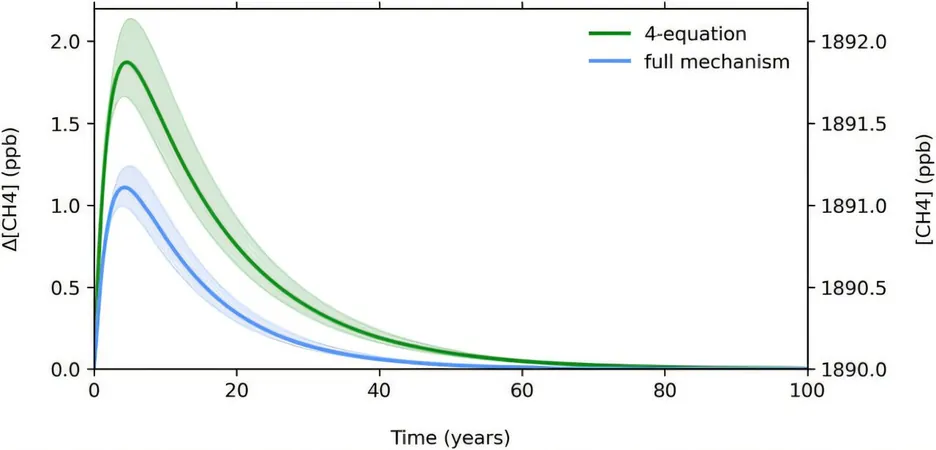
Asylum Seekers in the U.S. Face Alarming Health Crisis: 94% Report Psychological Stress Symptoms!
2024-12-05
Author: Rajesh
Introduction
A recent study has unveiled a shocking health predicament among asylum seekers entering the United States. A staggering 94% of individuals revealed high levels of psychological stress, while 47% reported symptoms of cardiovascular disease (CVD), and 50% experienced somatic pain after arrival, according to findings published in Nature Mental Health.
Study Details and Findings
Conducted at the Weill Cornell Center for Human Rights, the study encompassed medical, psychological, and gynecological evaluations of 453 asylum seekers. The results highlight an urgent need to address the health challenges faced by this vulnerable population. Dr. Gunisha Kaur, an anesthesiologist and human rights researcher, noted that CVD symptoms appeared alarmingly in this young demographic, with a median age of just 30. Symptoms such as palpitations (33%), presyncope/syncope (25%), stroke signs (20%), and chest pain (16%) were documented among the CVD-positive participants, raising significant concern about their overall health status.
Commentary from Dr. Kaur
Dr. Kaur commented, “We didn’t anticipate finding such high rates of these conditions in what is considered a generally healthy age group.” However, she cautioned that these findings might underestimate the actual prevalence, suggesting that the initial evaluations were not specifically tailored to detect these serious health issues effectively.
Psychosocial Struggles of Asylum Seekers
Asylum seekers, who are individuals fleeing persecution and serious human rights violations, often endure various psychosocial struggles. Factors such as housing instability, employment limitations, and lack of access to healthcare contribute to their heightened vulnerability. The stress of waiting for an asylum decision can lead to prolonged psychological distress, exacerbated by experiences like immigration detention, family separation, and the looming threat of deportation.
Prevalence of Stress and Health Conditions
The data underpinning this study, covering the years 2010 to 2020, highlights that nearly half of the participants (46%) suffered from both cardiovascular issues and psychological stress, while 31% faced a trifecta of CVD, stress, and pain symptoms. Alarmingly, among those screening positive for stress, 89% reported anxiety, 85% experienced depression, and 82% had sleep disturbances. Pain manifestations were also prevalent, with headache (52%), musculoskeletal pain (39%), and abdominal pain (34%) frequently reported.
Call to Action
These findings prompt a clarion call for healthcare providers and policymakers to prioritize the health and well-being of asylum seekers in the U.S. Increased access to rehabilitation services and comprehensive healthcare could dramatically improve outcomes, benefitting both the individuals and the communities they inhabit.
Future Research and Commitment
Dr. Kaur and her team are committed to further investigating these troubling health patterns and exploring potential interventions. "Now that we know these diseases are unexpectedly prevalent, we should take definitive action," she asserted. “Addressing these issues head-on not only aids individuals but enhances the health of our broader communities.
Conclusion
As the plight of asylum seekers continues to unfold, the urgent need for systemic change in healthcare access and support is becoming increasingly apparent. If we ignore these warnings, we risk overlooking a burgeoning health crisis within one of the world’s most vulnerable populations—one that affects us all.





 Brasil (PT)
Brasil (PT)
 Canada (EN)
Canada (EN)
 Chile (ES)
Chile (ES)
 España (ES)
España (ES)
 France (FR)
France (FR)
 Hong Kong (EN)
Hong Kong (EN)
 Italia (IT)
Italia (IT)
 日本 (JA)
日本 (JA)
 Magyarország (HU)
Magyarország (HU)
 Norge (NO)
Norge (NO)
 Polska (PL)
Polska (PL)
 Schweiz (DE)
Schweiz (DE)
 Singapore (EN)
Singapore (EN)
 Sverige (SV)
Sverige (SV)
 Suomi (FI)
Suomi (FI)
 Türkiye (TR)
Türkiye (TR)